2024-11-19
The "WTA·Xianghu Dialogue 2024" was recently held in Sanya, Hainan, where global tourism leaders gathered to share insights on the topic "Trends and Future Outlook of Tourism Education Development".
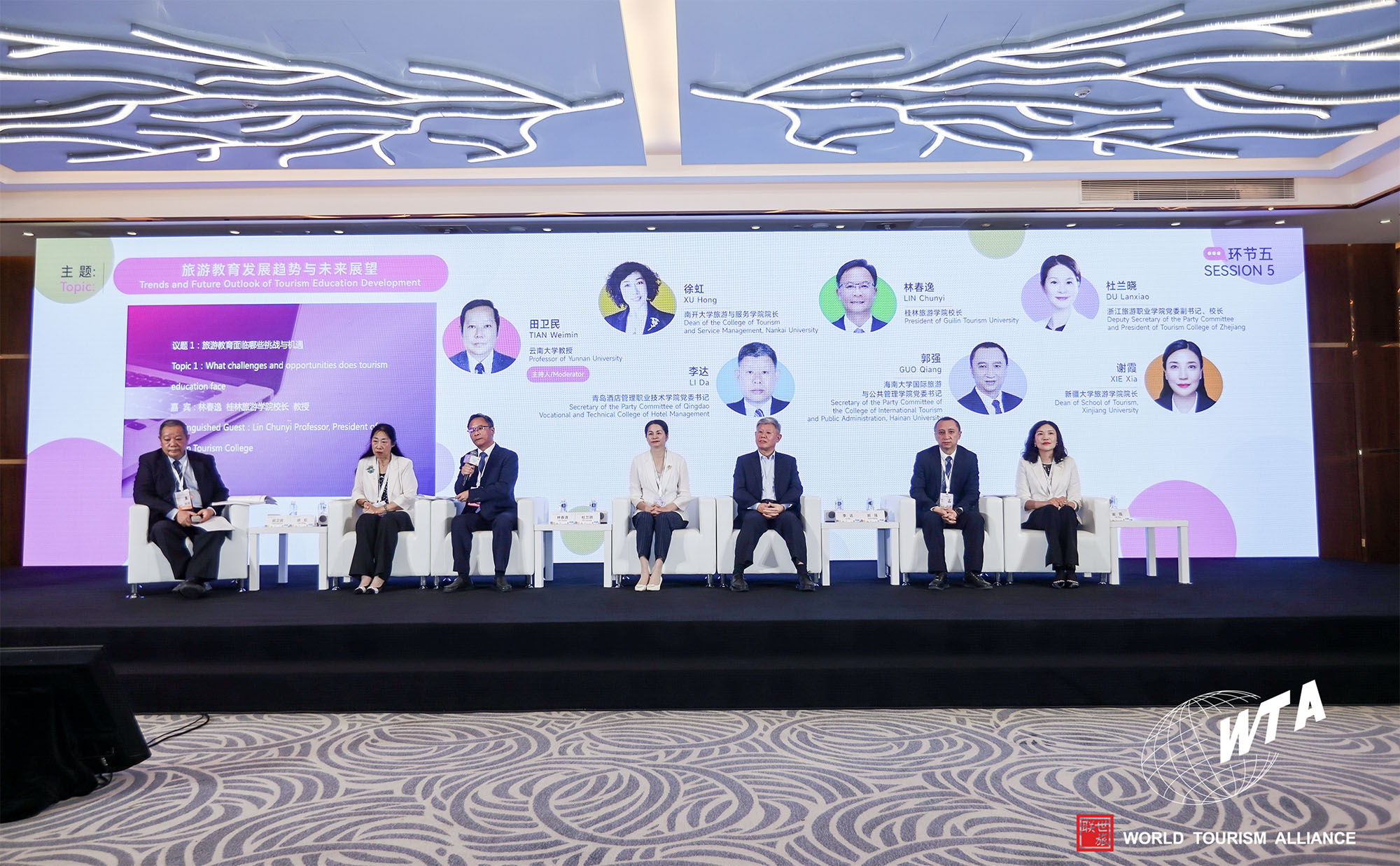
Moderator:
Dr. TIAN Weimin, Professor of Yunnan University
Panelists:
Dr. XU Hong, Dean of the College of Tourism and Service Management, Nankai University
Dr. LIN Chunyi, President of Guilin Tourism University
Dr. DU Lanxiao, Deputy Secretary of the Party Committee and President of Tourism College of Zhejiang
Dr. LI Da, Secretary of the Party Committee of Qingdao Vocational and Technical College of Hotel Management
Dr. GUO Qiang, Secretary of the Party Committee of the College of International Tourism and Public Administration, Hainan University
Dr. XIE Xia, Dean of School of Tourism, Xinjiang University
Here is a transcript of the discussion:
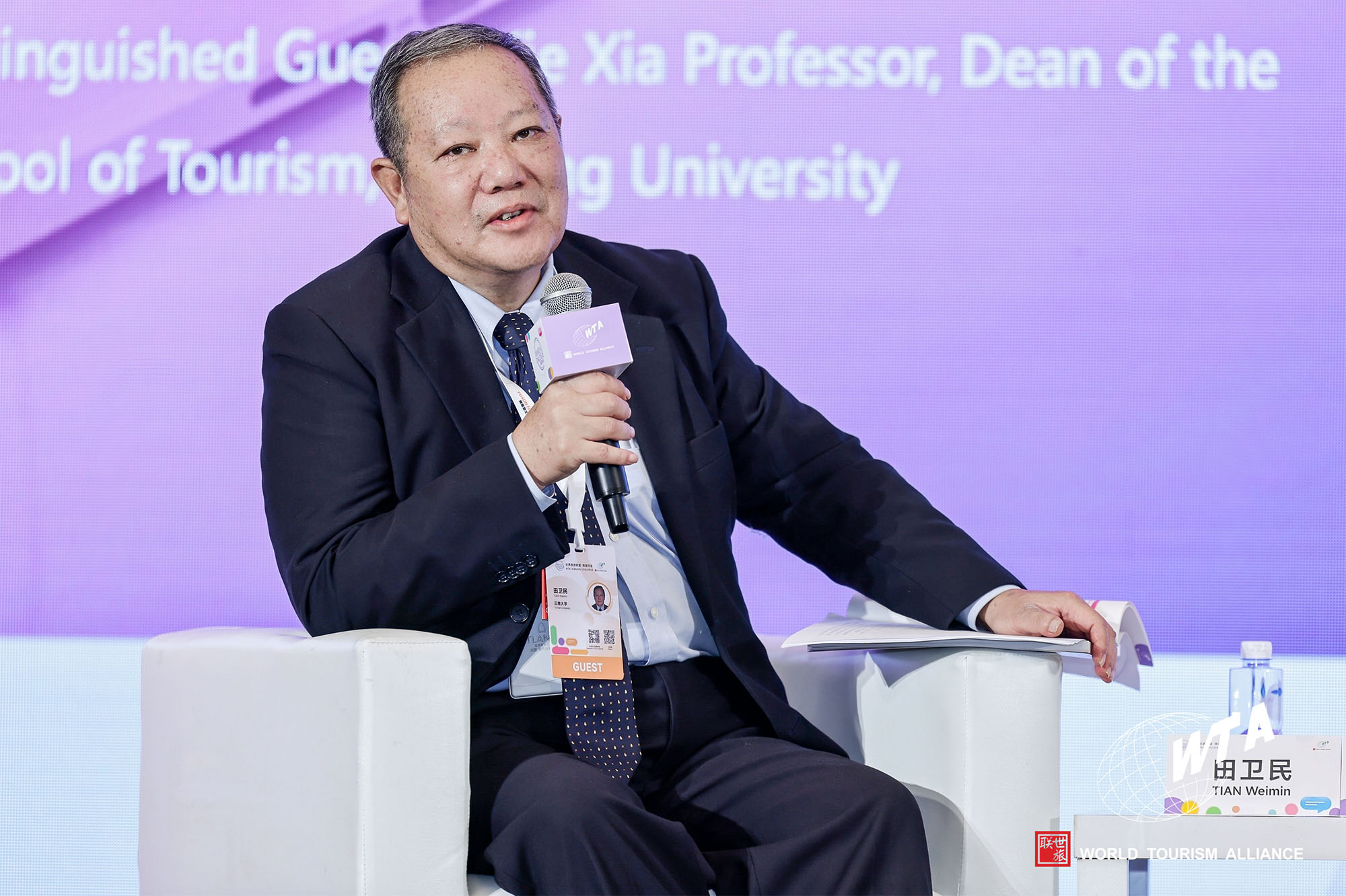
Moderator: Let’s begin with a discussion on the opportunities and challenges faced by tourism education. As front-line educators, what are your perspectives on these issues?
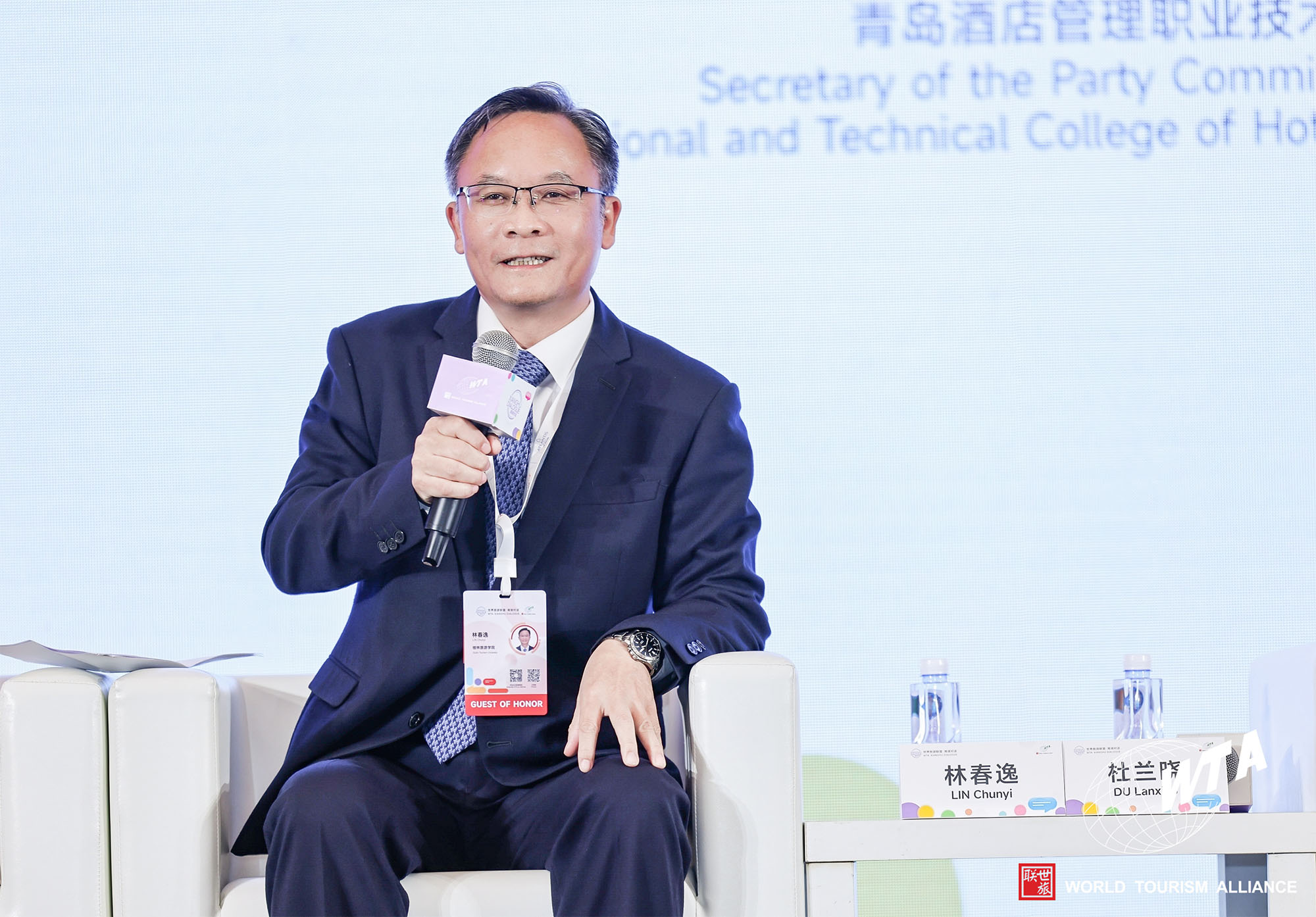
Dr. LIN Chunyi: Let me highlight three major opportunities for the development of tourism education. 1. Strategic opportunities: In the process of advancing Chinese-style modernization, tourism plays an irreplaceable role in promoting economic growth, improving people’s livelihoods, shaping the nation’s image, and facilitating cultural exchanges. Its unique value in strengthening the sense of community among the Chinese people and contributing to building a shared future for humanity is becoming increasingly significant. 2. Industry opportunities: We are now in the era of "Tourism+All Industries" and "All Industries+Tourism". Recently, the National Development and Reform Commission released the Catalogue for Guiding Industry Restructuring (2024 Version), explicitly listing tourism as a priority industry, with a focus on supporting new tourism formats. With the rapid development of these new formats, tourism education in China is poised to witness unprecedented growth opportunities. 3. Artificial intelligence facilitating tourism education: AI’s impact on tourism education is transformative. It is reshaping the ecosystem, offering unparalleled opportunities for high-quality development in the field.
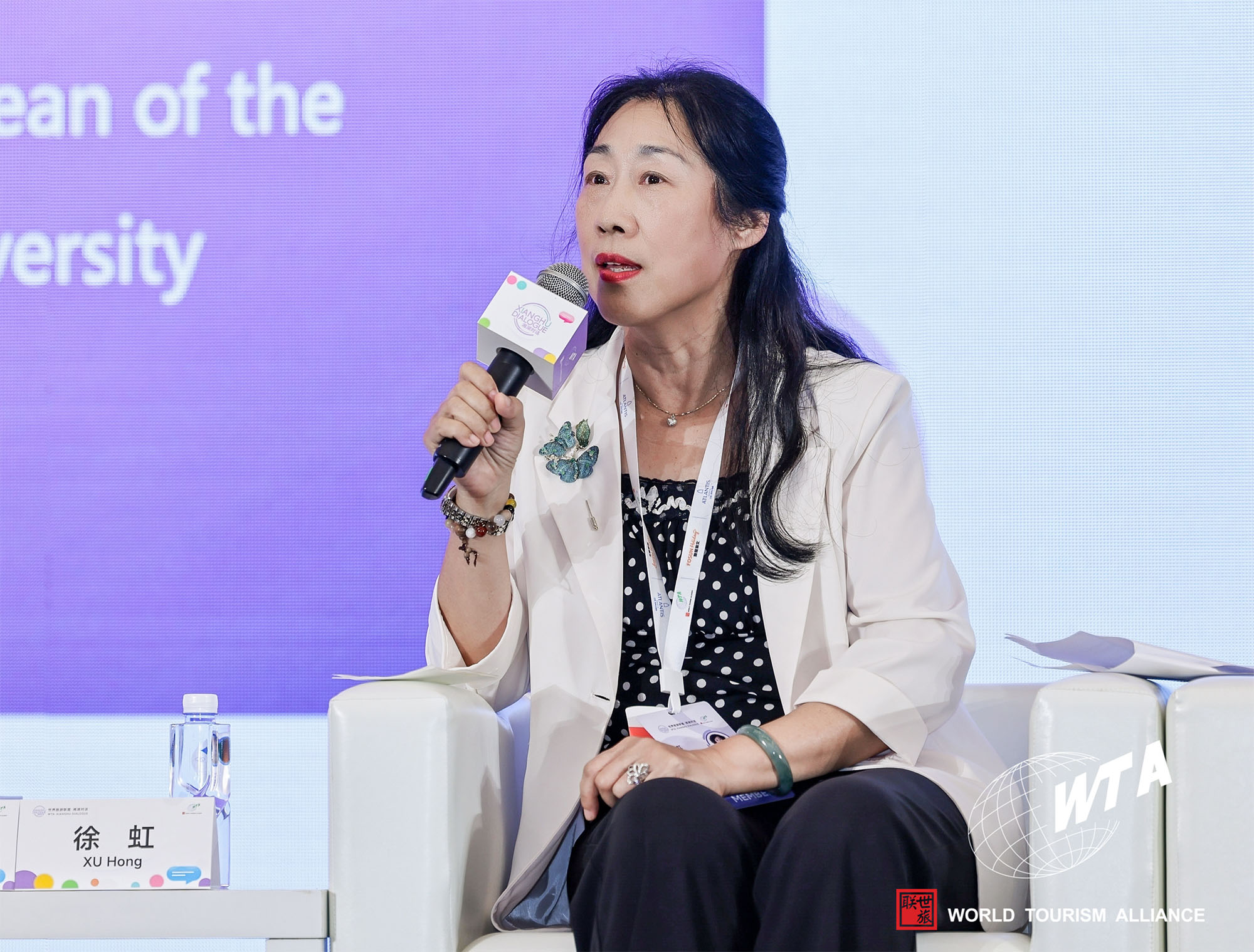
Dr. XU Hong: As tourism education evolves, a pressing question arises: Should we update and innovate the current knowledge system? The knowledge system is essentially a systematic and structured categorization of information related to tourism. Two core issues demand deep reflection. 1. Reconstruction of knowledge Frameworks: As China aims to become a global leader in tourism and education by 2035, the education system must cultivate adaptable talent to meet these goals. This requires addressing technological advancements, cultural preservation, and the innovative development of new knowledge. 2. Alignment with the industry needs: China’s tourism industry has seen remarkable growth over the past 40 years. It is essential to develop a knowledge framework grounded in domestic practices that aligns with the nation’s unique needs while contributing to global tourism development. As a tourism powerhouse, China must shoulder the responsibility of providing innovative knowledge for the global tourism community.
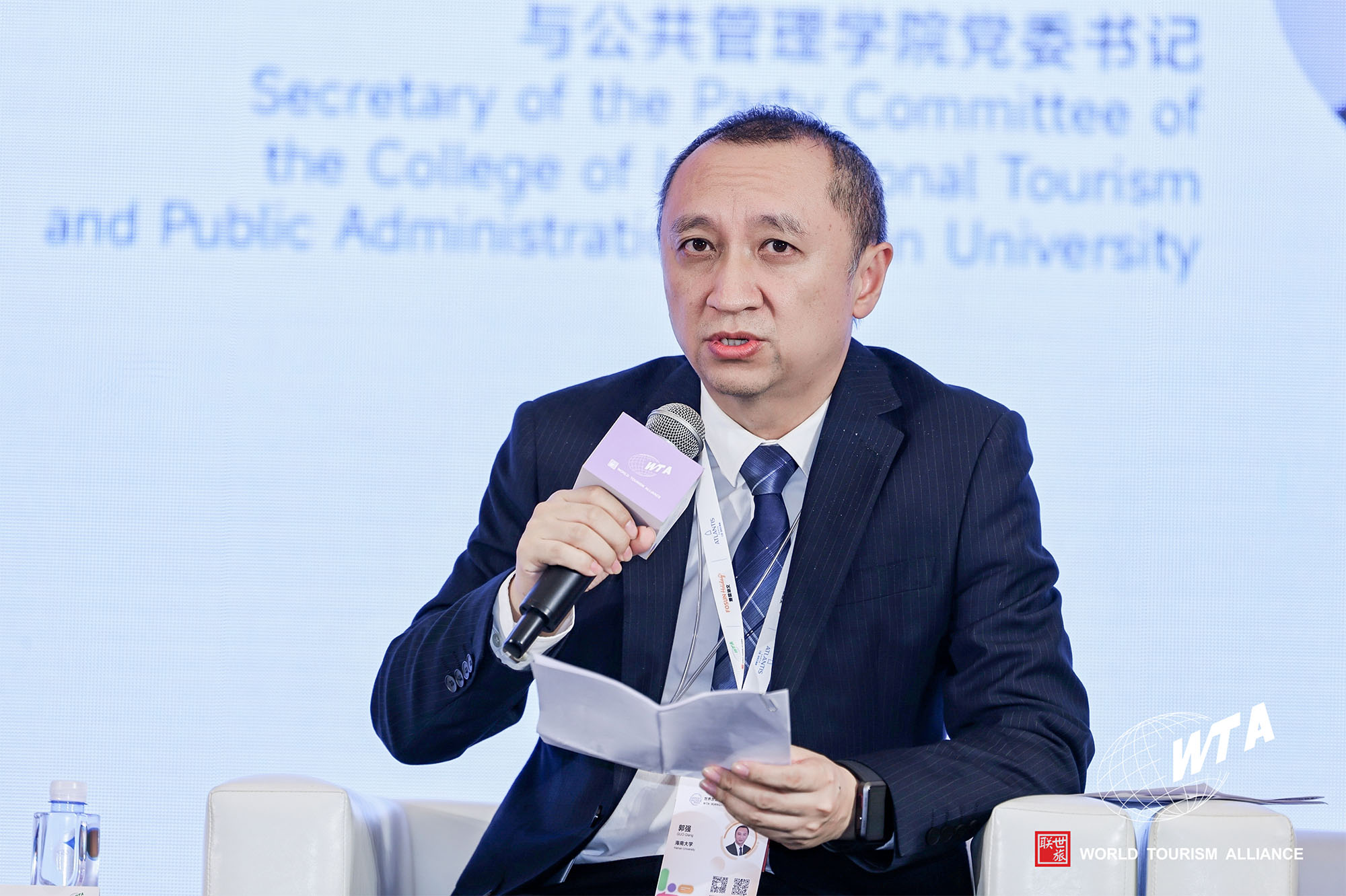
Dr. GUO Qiang: The digital transformation of tourism education is a critical pathway for achieving professional advantages and international competitiveness in China’s tourism education sector. The core of digital transformation lies in leveraging cutting-edge technologies such as cloud computing, big data, blockchain, digital twin, and artificial intelligence. These technologies enhance the production, dissemination, and accessibility of knowledge while supporting educational decision-making. The digital transformation of tourism education should adhere to five principles. 1. Student-centered approach: Fully implement a student-focused educational philosophy powered by information technology. 2. Alignment with industry needs: Ensure that industry demands and teaching content are seamlessly connected through digital tools. 3. Integration of multidisciplinary resources: Effectively combine resources from various disciplines to nurture versatile tourism professionals. 4. Empowerment through technology: Enhance the teaching and learning experiences of students, educators, and administrators by improving efficiency and effectiveness. 5. Reform educational management: Decentralize authority to students and teachers, fostering a flat organizational structure and a responsive digital education environment.
Moderator: Recently, the term "lying flat" has become a buzzword online. As educators, how should we interpret this phenomenon?
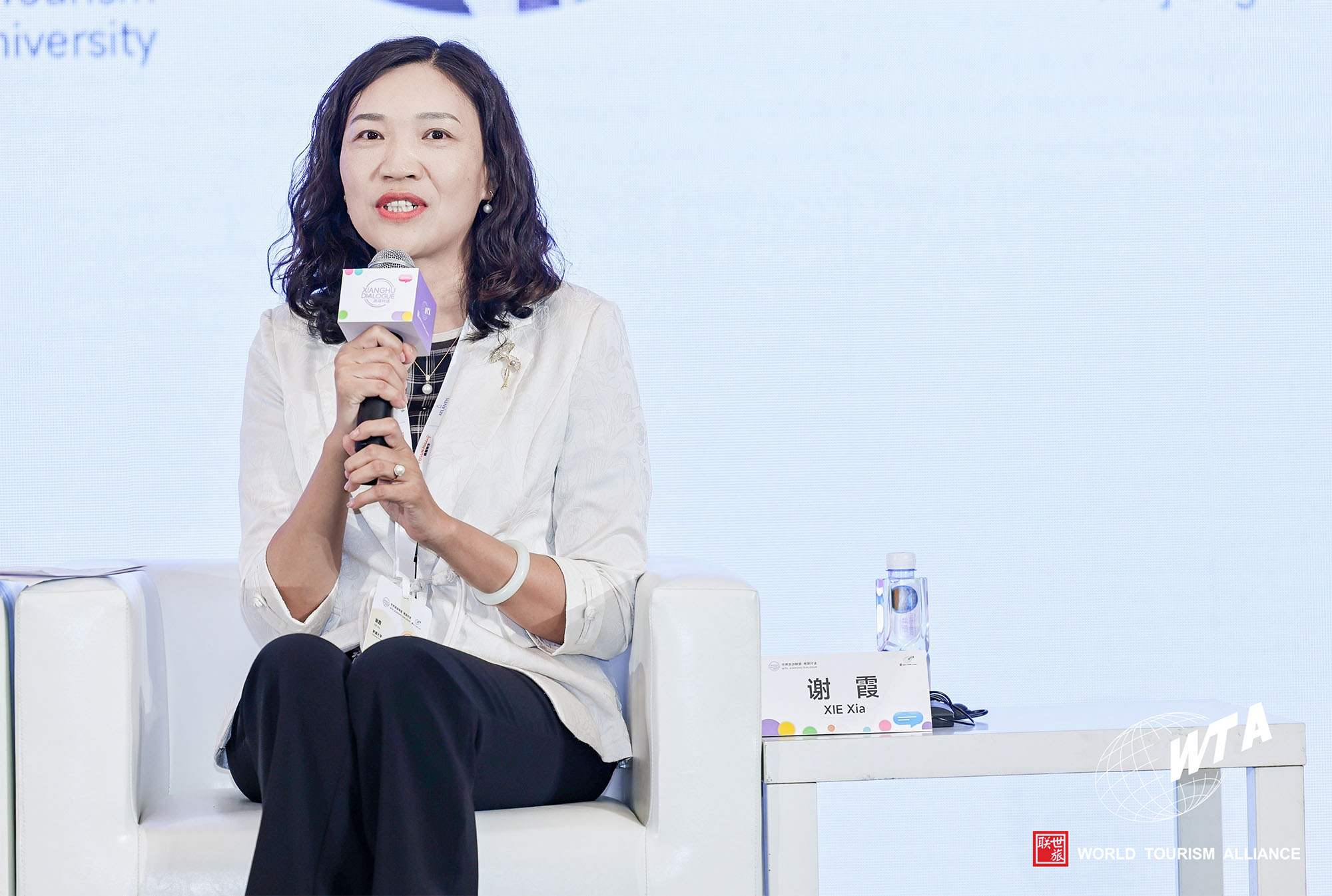
Dr. XIE Xia: "Lying flat" is a passive lifestyle adopted by some young people when facing academic, employment, and life pressures. It’s characterized by three main traits. 1. Simplified lifestyles: Students in this state no longer pursue material comforts or extensive social circles. They seem content with meeting basic needs, living in a comfortable environment, and maintaining a minimalistic life. 2. Playful communication: These students often use lighthearted, sometimes sarcastic expressions and create their own discourse systems online. 3. Inner conflict: Not all students embracing "lying flat" are entirely disengaged. Many oscillate between inertia and ambition. Several factors contribute to this trend. 1. Economic pressures: Living costs in major cities push some students to adopt this attitude. 2. Lack of effective family-school communication: Parents often believe that universities bear the primary responsibility for education, resulting in reduced involvement in their children’s growth. 3. Self-awareness challenges: Some students overestimate their abilities, expecting success without effort, a mindset they term “lying to win”. Others suffer from low self-esteem, becoming demotivated and eventually adopting the “lying flat” approach.
Moderator: How can we enhance the employment competitiveness of tourism students?
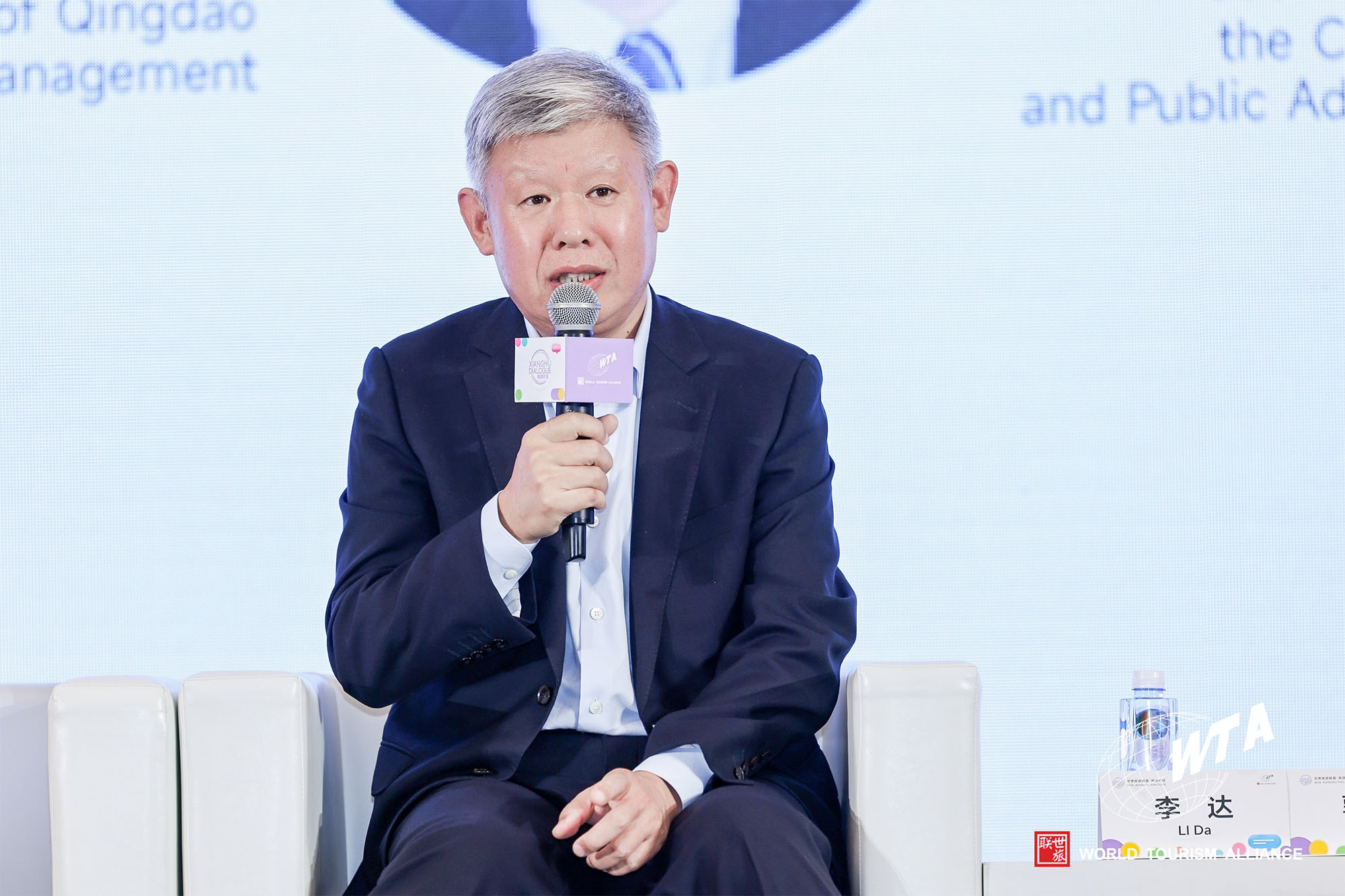
Dr. LI Da: Boosting graduates’ employability is a critical issue in education. Several factors influence this. 1. Unclear career awareness: Many students enter university without a clear idea of their career goals. This lack of direction often leads to a lack of motivation and, in some cases, a tendency to "lying flat". 2. Evolving market demands: As digitalization and intelligent transformation accelerate, new technologies, business formats, and models are constantly emerging. If educators fail to update curricula and integrate new knowledge into training programs, graduates may struggle to adapt to the job market. 3. Employers’ rising emphasis on comprehensive skills: The upgrade of the National Vocational Skills Competition to the World Vocational Skills Competition highlights a significant shift. While past competitions focused on assessing one or two fundamental skills, today’s emphasis is on comprehensive abilities, including planning, communication, problem-solving, and teamwork. This shift underscores the importance of developing well-rounded graduates equipped for diverse challenges.
Moderator: Looking ahead, what are the potential areas for development and innovation in tourism education?
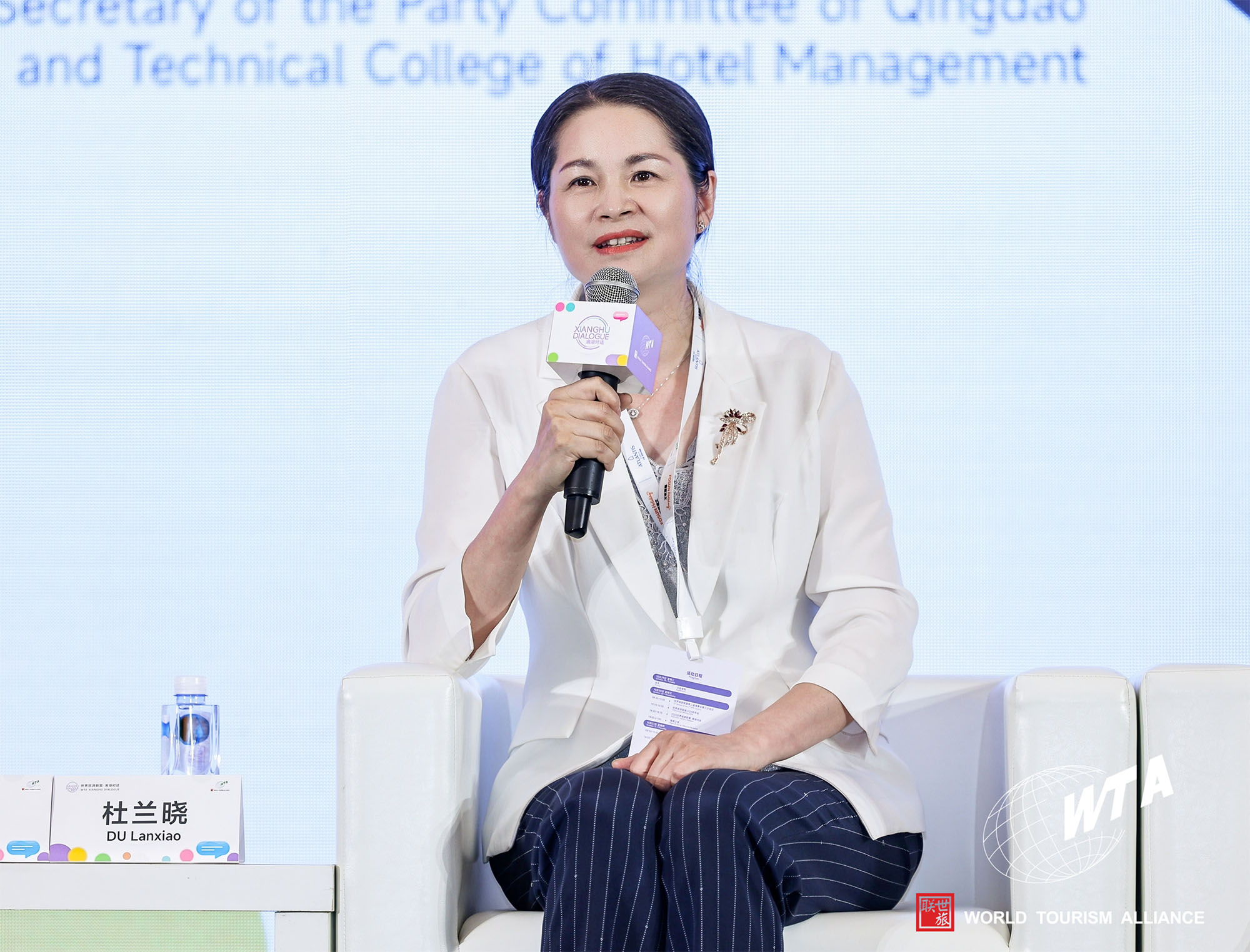
Dr. DU Lanxiao: I see five key areas of development potential for tourism education. 1. Policy support: In recent years, China has introduced numerous favorable policies for the tourism industry, creating an excellent policy environment for tourism education. 2. Demand for high-caliber talent: The transformation and upgrading of the tourism industry have significantly increased the demand for high-quality professionals. 3. Advancements in digital technologies: The rapid growth of technologies such as artificial intelligence (AI), virtual reality (VR), and the metaverse injects new vitality into tourism education innovation. 4. Integration of industry and education: The deep integration of industry and education is a central theme in vocational education and a key aspect of tourism education. By fostering deep integration between industries and academia, this approach introduces education into enterprises, creating more opportunities to cultivate talent. 5. Global outreach of education: Under the framework of building China into an educational powerhouse, tourism, as a bridge for friendship, cultural exchange, and international communication, has vast potential to promote China’s educational philosophies and teaching methods worldwide.
Dr. LIN Chunyi: Currently, we face three significant challenges in tourism education. 1. Challenges from emerging productive forces: With the rise of new productive forces in cultural tourism, the industry is experiencing waves of digitalization, smart technologies, and green development. These trends are reshaping the tourism landscape, compelling us to rethink talent cultivation models to align with these changes. 2. Mismatch between education and industry needs: Tourism education lags behind industry demands in its concepts, content, and methods. This calls for an urgent transformation to better align education with industry developments. 3. Imbalance between capability and status: Although tourism is recognized as a strategic pillar industry and a vital driver of happiness and livelihoods, its academic standing does not match its societal role. To bridge this gap, we need to establish tourism as a primary academic discipline, enhancing its academic stature to reflect its strategic importance. Strengthening the scientific and systematic study of tourism will further elevate its knowledge system and professional recognition.
Dr. XU Hong: The knowledge framework for tourism can be divided into four categories. 1. Knowledge based on epistemological reconstruction: In an ever-changing world, it is essential to rebuild our international perspective. This includes fostering cultural inclusivity in exchanges and enhancing industry recognition and respect. Epistemological reconstruction is the foundational logic for building this knowledge system. 2. Knowledge rooted in theoretical reasoning: As an interdisciplinary field, tourism requires students to not only master tourism theories but also build a strong foundation in other disciplines. This enhances their critical thinking and analytical skills. 3. Knowledge aimed at professional skill development: In specialized fields like hospitality, travel agencies, and attractions, students need the relevant knowledge systems and competitive skills to succeed. 4. Knowledge grounded in long-term practical ability: Without hands-on practice, students risk becoming mere repositories of theoretical knowledge rather than capable, self-reliant individuals. Social practice is crucial for updating and validating the knowledge system. These four layers of knowledge systems are interconnected, ultimately equipping students with the tools for growth in both skills and wisdom.
Moderator: How can we further deepen digital transformation in education?
Dr. GUO Qiang: Deepening the digital transformation of education involves eight critical areas. 1. Developing clear digital strategies: Establish long-term and phased goals for the digitalization of tourism education, backed by policies, funding, technology, and human resources. 2. Advancing digital resources: Build high-quality tourism education databases, including case studies, literature archives, and image collections. 3. Innovating teaching methods: Combine online and offline models, like flipped classrooms, where students prepare through targeted pre-class materials and engage in deeper discussions and practice during lessons. 4. Improving teacher digital literacy: Provide regular training for educators to enhance their digital teaching skills and facilitate the exchange of digital teaching experiences. 5. Reforming evaluation systems: Leverage digital tools to track learning progress, predict attitudes, and map growth trajectories, enabling diversified evaluations. 6. Digitalizing industry-academia collaboration: Share digital resources with tourism enterprises to co-develop educational programs and curricula. 7. Exploring international strategies: Introduce high-quality international digital education resources while exporting China’s digital courses globally, enhancing tourism education’s international influence. 8. Strengthening technical support: Enhance campus networks, data centers, and infrastructure to ensure the secure and stable operation of digital teaching platforms.
Moderator: Returning to the topic of "lying flat" among students, what are the most effective ways to address this issue?
Dr. XIE Xia: Tackling the “lying flat” phenomenon requires collective efforts at the societal, university, and family levels. 1. Foster fairness and justice in society: The government and society should break down industry barriers and optimize employment structures to ensure fair access to education and job opportunities. Positive media portrayals and role models can inspire students to embrace responsibility and a sense of mission. 2. Enhance university education quality: Universities should diversify disciplines and address individual needs to prevent homogeneous competition and offer students more jobs and career options. Improving mental health education is equally important to help students form positive employment outlooks. 3. Strengthen family education mechanisms: Parents should shift traditional teaching approaches, collaborate more closely with universities, and guide students toward healthy worldviews, values and life goals. Setting an example at home through positive family traditions can deeply influence students, fostering proper self-awareness.
Moderator: To truly resolve the "lying flat" issue, boosting employment is key. How can we enhance the employability of tourism students?
Dr. LI Da: Enhancing students’ employability can be achieved through three main approaches. 1. Career awareness: From the first year, tourism students should engage in social practices to better understand career paths. 2. Career planning education: Strengthen collaborations between universities and enterprises, encouraging industry participation in the education process. 3. Digital transformation: Faculty should engage with leading enterprises to study their digital transformation practices, identify market trends, and adapt educational content accordingly. Incorporating digital tools and platforms will improve student skills and competitiveness.
Dr. DU Lanxiao: Competitiveness can be summarized in four core abilities. 1. Adaptability: Align curricula and course design with industry needs to ensure compatibility with the industrial chain. 2. Hard skills: Redesign courses, teaching models, and practical training facilities to match technological advancements. 3. Contribution capacity: Tourism education institutions should act as think tanks for government and industry, emphasizing application-based research to drive collaboration between academia and industry. 4. Global influence: Deepen partnerships with top global tourism education institutions to enhance China’s voice and impact in international tourism diplomacy.
Moderator: Can each of you sum up your point of view in one sentence?
Dr. LIN Chunyi: We should understand, adapt, and proactively embrace change to ensure tourism education contributes to a better life.
Dr. XU Hong: Knowledge systems stem from practice and serves practice; only through continuous practice can they remain dynamic.
Dr. GUO Qiang: Tourism education can tackle laziness, biases, and narrow perspectives.
Dr. XIE Xia: Most university students are vibrant and motivated. Let’s work together to transform the few “lying flat” students into ambitious achievers who can realize their potential.
Dr. LI Da: Improving graduate employability requires a comprehensive approach, from top-level system design to execution.
Dr. DU Lanxiao: Tourism education has limitless potential in China. Let’s unite, uphold integrity and innovation, and work tirelessly to achieve high-quality development in tourism.